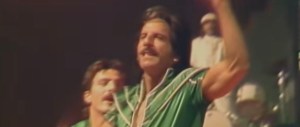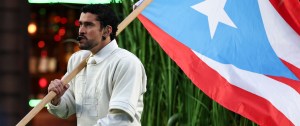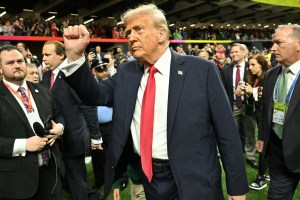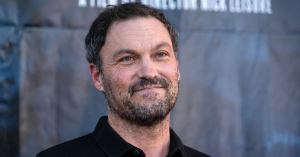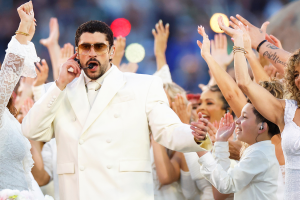Hulu’s The Handmaid’s Tale, based on the dystopian novel by Margaret Atwood, has quickly become required viewing for feminists in the Trump era. Yet the show’s cast has been evasive when it comes to actually calling the show a feminist work.
At the Tribeca Film Festival’s screening last month, the show’s star, Elisabeth Moss, stated, “For me, [The Handmaid’s Tale is] not a feminist story. It’s a human story because women’s rights are human rights.” Though the assertion that “women’s rights are human rights” is often a rallying cry among feminists vying for equality, Moss seemed to be using the phrase to shy away from assertions of feminism.
Videos by PopCulture.com
Fellow cast member Madeline Brewer responded similarly: “I think that any story […] that’s just a powerful woman owning herself in any way is automatically deemed ‘feminist.’ But it’s just a story about a woman. I don’t think that this is any sort of feminist propaganda. I think that it’s a story about women and about humans […] This story affects all people.”
These responses, which seemed aimed to distance the show from the term “feminism” (if not its actual tenets), confused many viewers. While this was quickly painted by many outlets as little more than pandering to a wider audience, there is something about Brewer’s answer in particular that makes me wonder… what, exactly, is the cast of the show balking at when they refuse to call it “feminist”?
‘The Handmaid’s Tale’ feels eerily prescient in the wake of the GOP health care bill vote https://t.co/9rRPnSiTrT pic.twitter.com/nqUIdTSxgS
— Mic (@mic) May 5, 2017
Brewer’s choice of words may be telling. When she states, “I don’t think that this is any sort of feminist propaganda”, does she mean to say that she doesn’t think the central aim of the show is to “convert” viewers to feminism? If so, that seems like a reasonable claim. The show is more complex than that, richly woven in its own right separate from its possible political drive (if one can even do that to a piece of art). Although the show (and its 1985 novel) is clear about what “side” the viewer is supposed to be on, its story serves more as a warning than a piece of propaganda.
Atwood herself wrote in The New York Times her hope that “If this future can be described in detail, maybe it won’t happen… But such wishful thinking cannot be depended on either.” Atwood seems to position the text as a cautionary tale, a way to inspire resistance before it is too late. (If that’s the aim of the Hulu series, it’s succeeding — protesters have already begun donning Handmaid’s Tale-inspired costumes to protest bills that would infringe on the reproductive rights of women.)
Atwood, for all her brilliant storytelling, seems to have a less-than-appreciative view of feminism, jarringly akin to women who are proud to say they don’t need feminism.
In her New York Times piece, she creates a somewhat bizarre polarization of the term:”…Is ‘The Handmaid’s Tale’ a ‘feminist’ novel? If you mean an ideological tract in which all women are angels and/or so victimized they are incapable of moral choice, no.” I don’t know of any feminism that defines itself this way, but apparently Atwood does.
‘It can’t happen here’ … until it does. @megangarber on the epidemic of complacency in ‘The Handmaid’s Tale’ https://t.co/ZUmo4cMEgr pic.twitter.com/aO1mICArps
— The Atlantic (@TheAtlantic) May 1, 2017
In a conversation with Elisabeth Moss (where, mercifully, Moss does identify openly as a feminist), Atwood describes a hypothetical “feminist” version of The Handmaid’s Tale as “only a feminist book” — which seems to be in line with her belief that many definitions of feminism reduce women to either Madonnas or mice. Atwood’s quote continues: “If it were only a feminist book, you would think, in that case, all the women are over here on the low side, and all the men are over here on the high side.”
Writers much smarter than I have written extensively about the various power imbalances between classes of women in the series, but it does seem to me that this does little to invalidate the work as a feminist text. (In case it’s not already clear, I’m not operating under the same definition of feminism that Atwood is.)
There is also the possibility that the cast simply means to convey that the show is not exclusionary, that (as Brewer says) it is a story that “affects all people”, presumably regardless of gender or political leanings. If this is what Brewer, Moss and Atwood truly mean, then they’re right: This is a show for everyone, especially at a political moment so steeped in upheaval that the future Atwood depicted in 1985 doesn’t feel so terribly far from our own. In short, if the cast simply wants to communicate that The Handmaid’s Tale is inclusive, then I agree — and so, ideally, is feminism.
This story originally appeared on Womanista.com
MORE:
- Hulu Renews The Handmaid’s Tale For Season 2
- Amazon Spring 2017 Pilot Season Includes Sci-Fi and Superheroes
- Gilmore Girls Star Discusses Whether More Episodes Are To Come
[H/T Hulu]

